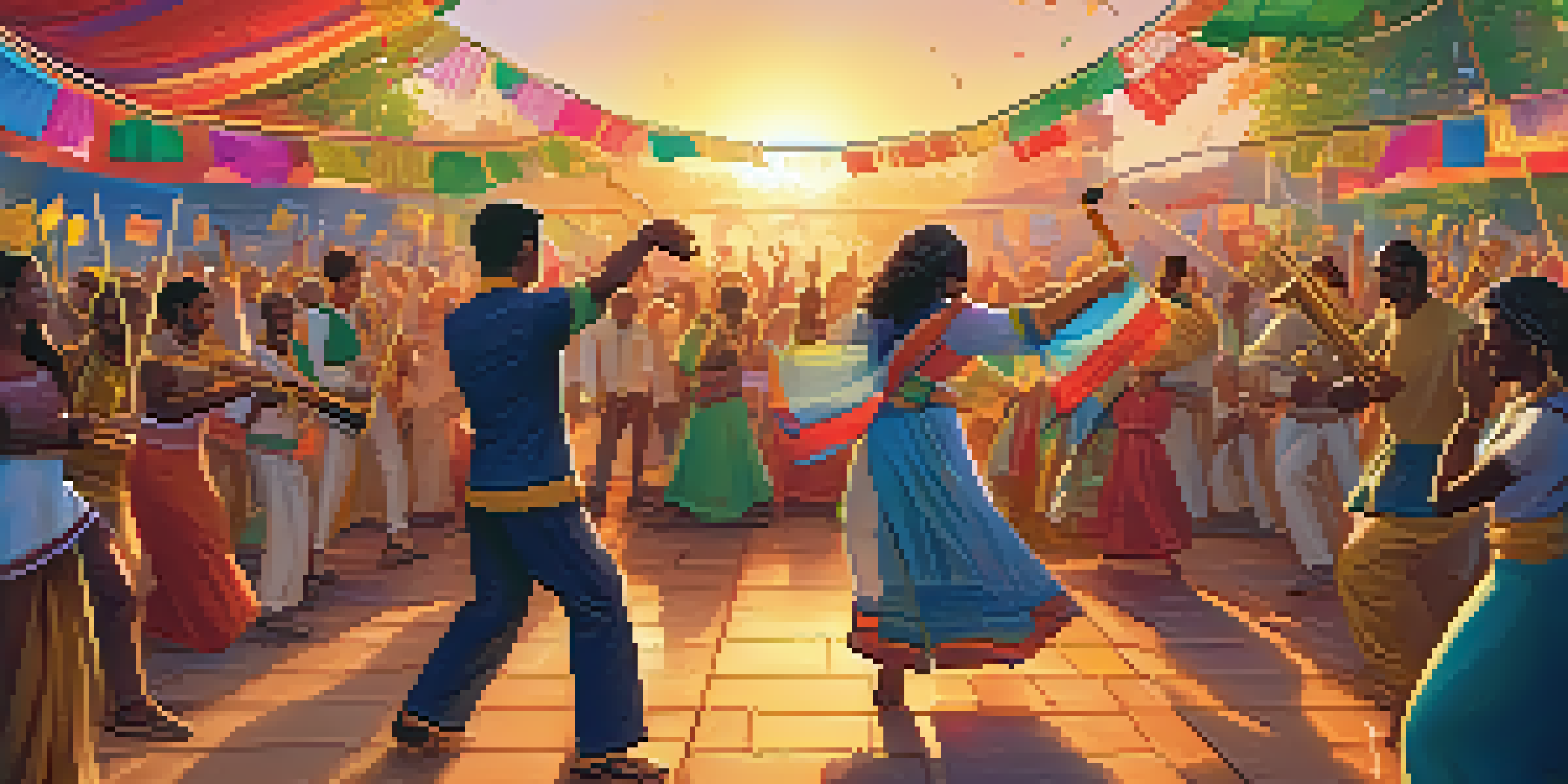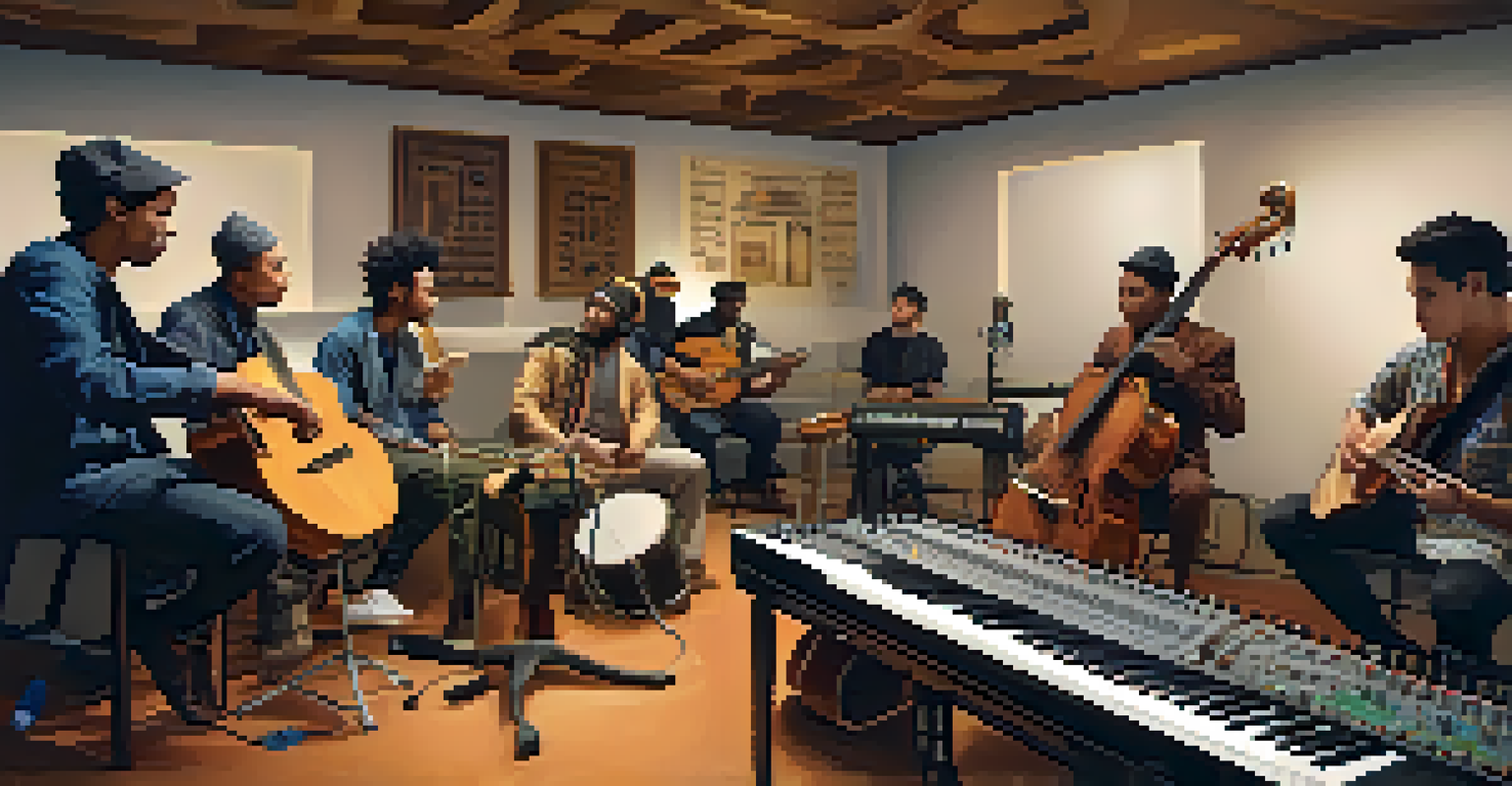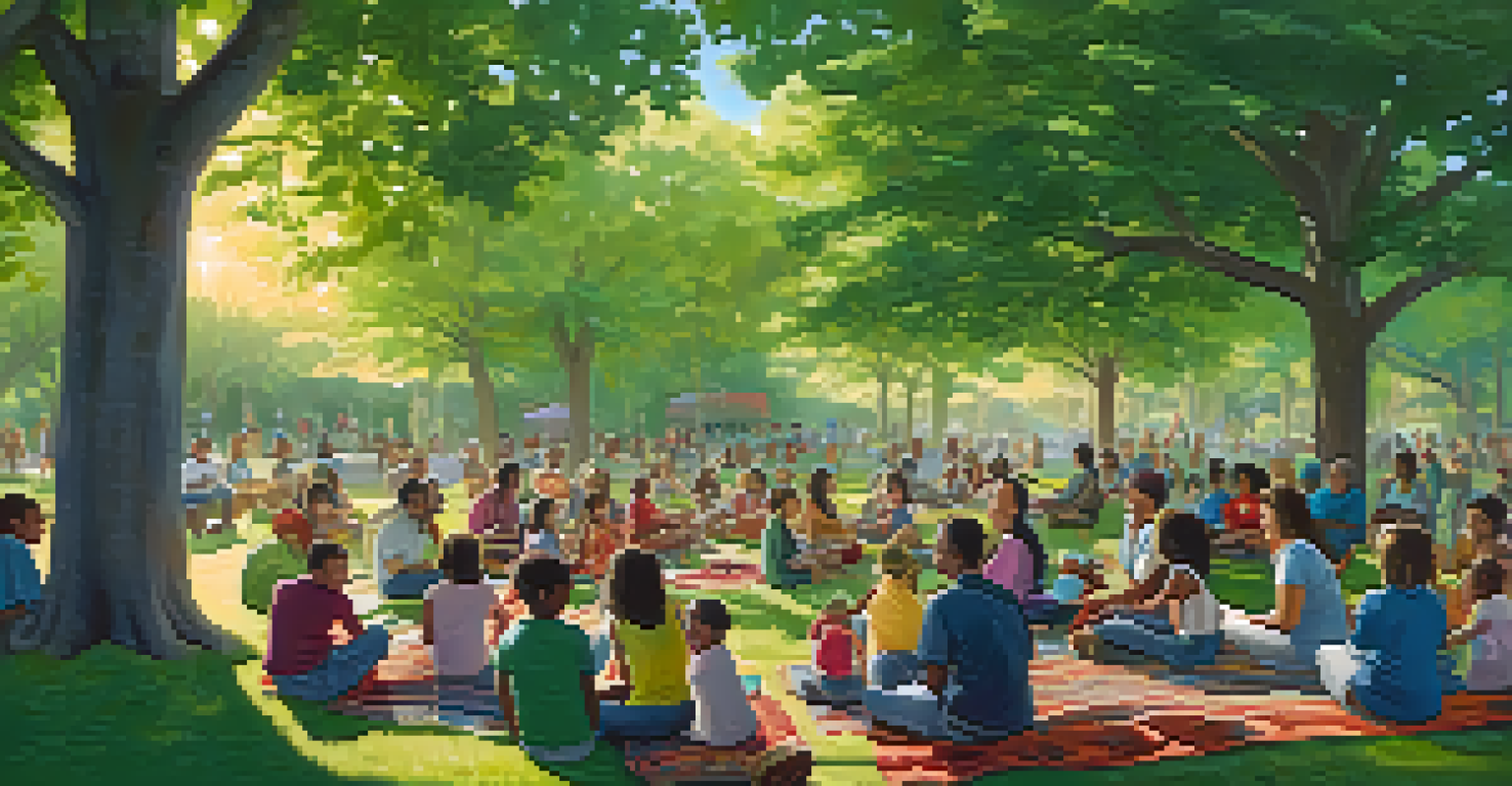Music as a Catalyst for Cultural Understanding and Unity

Music as a Universal Language Across Cultures
Music transcends language barriers, making it a universal form of expression. From African tribal drumming to Western classical symphonies, various cultures use music to communicate emotions, stories, and traditions. This shared experience allows people from different backgrounds to connect on a deeper level, often leading to mutual respect and understanding.
Music can change the world because it can change people.
For instance, the global popularity of genres like reggae and hip-hop demonstrates how music can convey powerful messages of social justice and unity. Artists like Bob Marley and Tupac Shakur have brought attention to cultural issues, resonating with audiences far beyond their origins. Their music not only entertains but also educates listeners about diverse life experiences.
In essence, music serves as a bridge, helping us to appreciate cultural nuances while celebrating our shared humanity. By engaging with music from various cultures, we begin to see the world through different lenses, fostering empathy and connection.
The Role of Music in Cultural Festivals and Events
Cultural festivals around the globe often showcase music as a central element, drawing diverse communities together. Events like the Rio Carnival in Brazil or the Diwali Festival in India highlight specific cultural identities while inviting outsiders to participate and learn. Through live performances, attendees experience the vibrancy of different musical styles and traditions.

These gatherings not only celebrate cultural heritage but also create opportunities for dialogue and collaboration. When people dance to foreign rhythms or sing along with unfamiliar melodies, they break down preconceived notions and stereotypes. This shared joy transforms music into a vehicle for cultural exchange and unity.
Music Connects Diverse Cultures
Music transcends language barriers, fostering empathy and understanding among people from different backgrounds.
Moreover, as people engage with music during these festivals, they often discover common values and themes that resonate across cultures. Whether it's love, struggle, or celebration, music connects us all, reinforcing the idea that despite our differences, we share similar hopes and dreams.
Collaborative Music Projects for Unity
Collaborative music projects, often featuring artists from different backgrounds, exemplify how music can foster unity. Initiatives like 'Playing for Change' bring musicians together to create songs that promote peace and understanding. These collaborations not only celebrate diversity but also highlight the beauty of working towards a common goal.
One good thing about music, when it hits you, you feel no pain.
An excellent example is the song 'One Love' by Bob Marley, which has been covered and adapted by countless artists worldwide. Each rendition adds a unique cultural flavor while maintaining the core message of love and unity. Such collaborations inspire audiences to appreciate the richness of different musical traditions while reinforcing a collective identity.
Through these projects, musicians can share their personal stories and cultural narratives, inviting listeners to engage and reflect. This shared experience often leads to a greater appreciation for one another's backgrounds, nurturing a sense of community that transcends borders.
Music's Impact on Social Movements
Throughout history, music has played a pivotal role in social movements, serving as an anthem for change. Songs like 'We Shall Overcome' during the Civil Rights Movement united individuals in their fight for equality. This powerful use of music transforms it into a rallying cry, inspiring collective action and cultural solidarity.
Similarly, contemporary movements like Black Lives Matter have utilized music to amplify their messages. Artists such as Kendrick Lamar and Beyoncé have incorporated social justice themes into their work, creating impactful soundtracks for activism. Their music not only raises awareness but also cultivates a sense of unity among supporters.
Festivals Celebrate Cultural Unity
Cultural festivals use music to bring communities together, promoting dialogue and collaboration through shared experiences.
By harnessing the power of music, social movements can foster a shared identity among diverse groups. This collective experience not only motivates individuals to join the cause but also encourages dialogue around important cultural issues, ultimately paving the way for greater understanding and change.
The Influence of Technology on Global Music Sharing
Technology has revolutionized how we share and experience music, breaking down geographical barriers in unprecedented ways. Streaming platforms like Spotify and YouTube allow users to access a diverse range of musical genres from around the world, creating a global music community. This accessibility encourages cross-cultural collaborations and exposure to new sounds and traditions.
Moreover, social media platforms enable musicians to share their work and connect with audiences directly. Artists from different cultures can collaborate virtually, resulting in innovative fusions that introduce listeners to new perspectives. For example, the blending of traditional Indian music with contemporary pop has created unique genres that resonate with diverse audiences.
As technology continues to evolve, so does our ability to appreciate and celebrate cultural diversity through music. This interconnectedness fosters a greater understanding of different musical traditions, reminding us that, despite our differences, we can come together in harmony.
Education and Music as a Tool for Cultural Awareness
Incorporating music education into school curriculums can significantly enhance cultural awareness among students. Learning about different musical traditions fosters appreciation for diversity and encourages children to explore their own cultural identities. Programs that include world music expose students to a variety of sounds, rhythms, and stories that reflect the richness of global cultures.
Furthermore, music classes often encourage collaboration, allowing students from different backgrounds to work together on projects. This hands-on experience promotes teamwork and understanding, as they learn to appreciate each other's talents and perspectives. It’s a beautiful reminder that music can serve as a common ground for building friendships.
Music Fuels Social Movements
Throughout history, music has served as an anthem for social change, uniting individuals in their struggles for justice and equality.
By fostering an environment of inclusivity through music education, we can nurture future generations that value cultural diversity. The skills and empathy developed can lead to a more harmonious society where individuals celebrate and learn from one another.
The Healing Power of Music in Cultural Conflict
Music has a remarkable ability to heal wounds caused by cultural conflict, providing solace and hope in challenging times. After periods of unrest, communities often turn to music as a means of reconciliation, using it to express grief and foster understanding. For example, post-apartheid South Africa saw the emergence of music as a tool for building bridges between divided communities.
Artists like Miriam Makeba used their music to advocate for peace and unity, helping to heal the scars of a tumultuous past. Through storytelling and shared experiences, music can create a safe space for dialogue, allowing individuals to confront their pain and move towards healing.

As communities come together to share music, they often discover common ground that transcends their differences. This collective healing journey not only promotes understanding but also paves the way for lasting unity and cooperation.